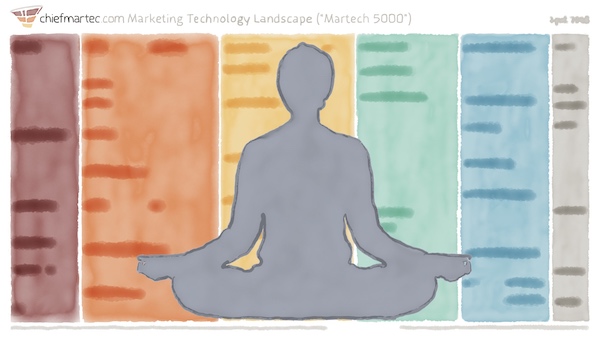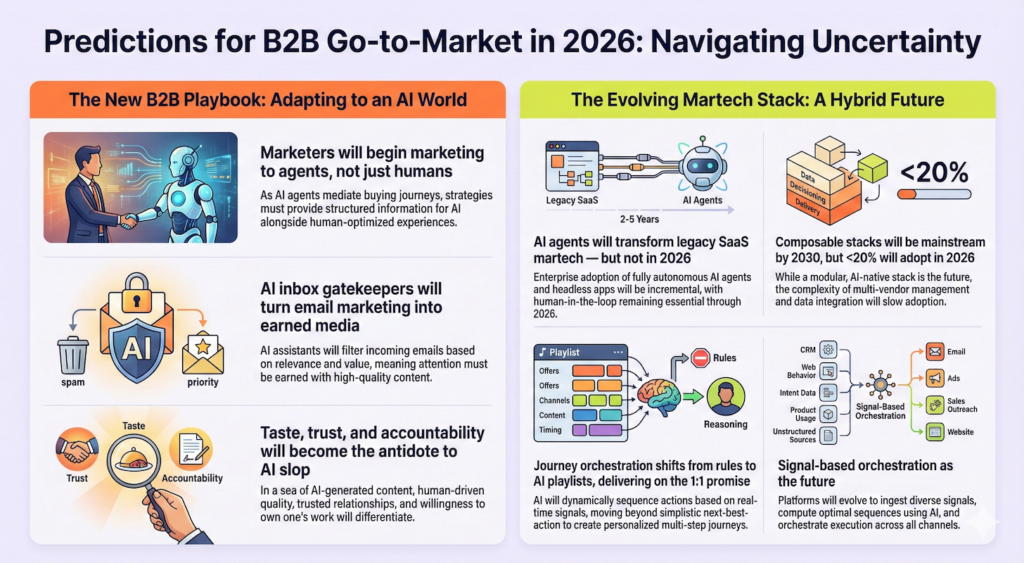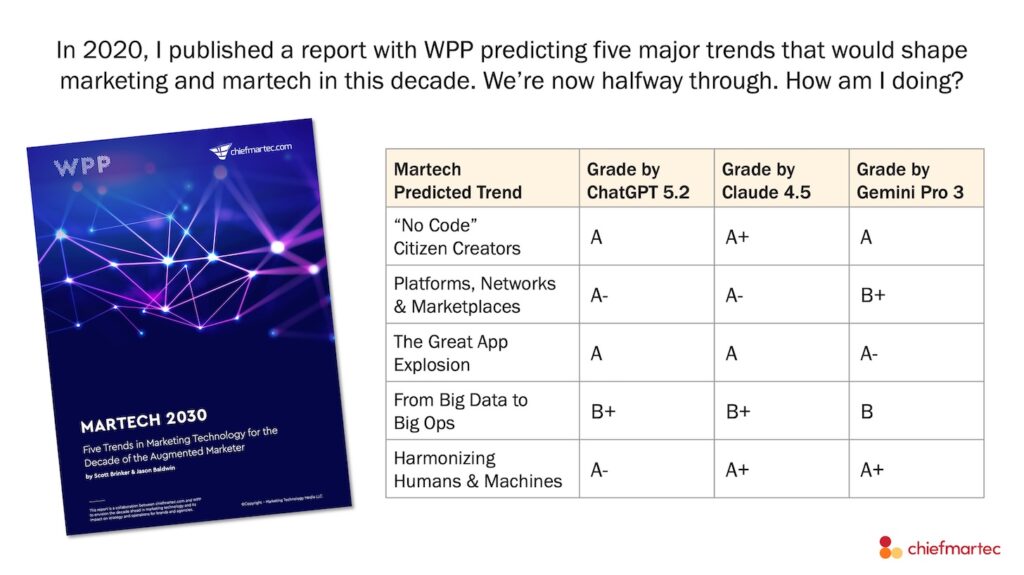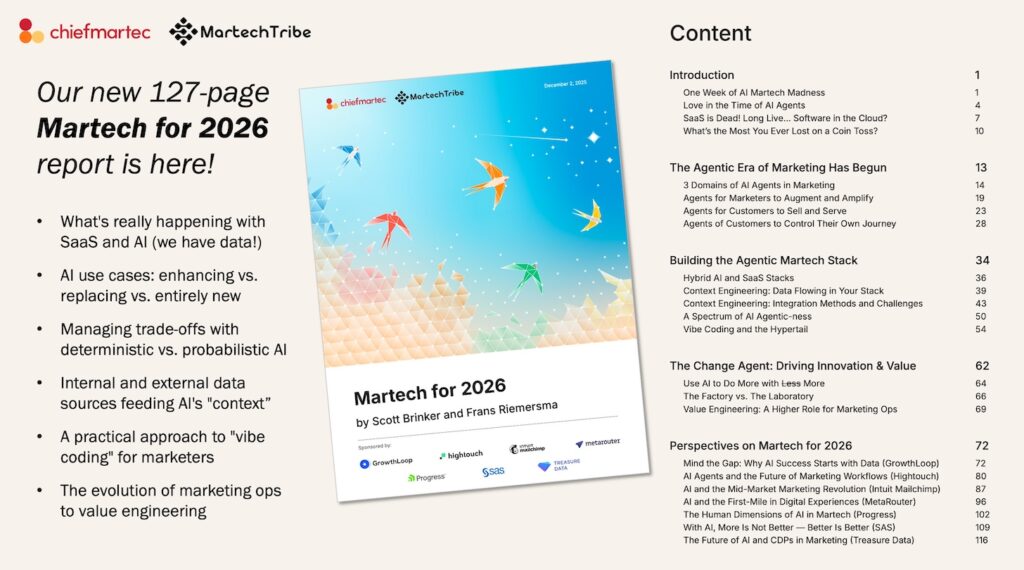At first, martech and mindfulness would seem to be on opposite ends of the great mandala of life. Let’s face it, the two words don’t often come up in the same sentence. Or really even the same conversation.
Mindfulness is a path toward peace.
Martech is a path toward pandemonium.
At least that’s the way it feels a lot of the time. Marketing and martech are pretty chaotic fields. Disruptions. Distractions. Deafening noise. Martech has elevated them to an art form. Okay, so maybe “elevate” and “art” aren’t quite the right terms for it.
It’s fair to say that “mindful martech” could qualify as an oxymoron.
But actually, it’s exactly because of the chaos that mindfulness is a worthwhile concept to bring to marketing technology management. The principles of mindfulness can help bring clarity and perspective to the frenetic pace of change happening across our industry and within our own organizations.
- Focus on the Present — narrowing your attention to a small number of priorities in any given timeframe, focusing on doing them well (this is one of the things I like best about the cadence of sprints in agile marketing)
- Acceptance — embracing the state of marketing and martech for what it is — a dizzying kaleidoscope ever-shifting in our view — without letting emotions such as frustration or fear cause us to deny the reality around us
- Beginner’s Mind — approaching marketing and martech with a fresh sense of curiosity and wonder each day, a willingness to continually experiment and learn, have fun
- Non-Attachment — understanding that everything changes — tools, tactics, processes, our own work, etc. — and that holding on to the past prevents us from embracing the future
- Compassion — recognizing that change is difficult for everyone, our colleagues and our customers, and striving to imbue empathy and kindness in all our interactions
One of the practices of mindfulness that I’ve found especially helpful in my own work is trying to observe things in our profession without judging them into pre-defined boxes. It’s easy to fall into the trap of labeling something as either “A” or “B” — when, in fact, many of the most interesting phenomena in martech are “A” and “B” or in some other way defy a dichotomy.
My last post on 3 trends driving the Second Golden Age of Martech — ecosystems, experts, and (citizen) engineers — was all about transcending the “tyranny of or.” Suite or best-of-breed. Software or services. Buy or build. In today’s world, those divisions aren’t necessary, and they can artificially limit your thinking.
Likewise, The New Rules of Marketing Technology & Operations talks about harmonizing forces that, at first, seem diametrically opposed — centralization vs. decentralization, automation vs. humanization. Stepping back to see the connections between them though, you can appreciate that they’re not locked in a battle, but more of a ballet.
But enough of my martech mindfulness metaphors.
It can help to simply bring a little bit of mindful meditation into a hectic martech day. A few deep breaths. A few minutes of closing your eyes and clearing your mind. It can reduce stress, refocus your energy, and make you more creative.
But don’t take my word for it.
There was a terrific article in Harvard Business Review this month, How Mindfulness Can Help Engineers Solve Problems. It was based on two studies conducted at Stanford University that showed how mindfulness practices helped engineering students generate more original ideas when tackling design tasks.
Engineering work demands creativity and innovation in order to solve complex, interdisciplinary problems. But creativity and innovation skills are not emphasized in many traditional engineering courses. So engineers enter the workforce with important analysis skills, but may struggle to “think outside the box” when it comes to creative problem-solving.
Our research shows that mindfulness can help engineers strengthen their ability to generate new ideas, leading to new ways of thinking and better solutions.
It’s a short but fascinating read. Engineering and mindfulness don’t naturally come to mind together. (Or at least they didn’t come to mine until I read that article.) But they are highly complementary. To quote a bit more:
Having an open and curious attitude is referred to as “beginner’s mind” — the capacity to bring fresh eyes to a problem and engage in new perspectives for how to solve it. By remaining open to experiences, we are more likely to make connections between seemingly unrelated concepts, which is crucial to generating original ideas.
Having a kind attitude is an aspect of self-compassion, which protects against harsh self-criticism and a fear of failure, inspiring people to take risks and explore uncharted territory, leading to novel solutions. Mindfulness supports both of these.
Intrigued? Well, I’m delighted to announce that one of the authors of that HBR article, Shauna Shapiro, a professor at Santa Clara University and an world-renown expert on mindfulness, has been added as one of our keynote speakers for our next MarTech conference in the Bay Area, April 3-5.
Given everything else that will be going on at the event — dozens of sessions from leading martech practitioners, over a hundred martech exhibitors, and over 2,000 of your peers eager to network and learn from each other — a little time to reflect on mindfulness in the middle will be a welcome interlude.




I think it’s brilliant! The only thing I would add there in context of mindful practices, it’s “loving kindness” or “gratitude”. Not only beneficial in terms of stress level reduction, but helps cross-department collaboration and breaking silos. We as marketers sometimes need to remember not to compete with sales, bizdev, and other teams, but to extend our awareness across the organization in order to get better data, understand customer better, and create incremental value.
Excellent point, Natasha. Gratitude is an incredibly powerful force, especially in the cross-functional reality of modern marketing.
Thank you, Scott! You know, the more I think about the approach you described here, the more I feel it’s applicable to the current strategic and tactical challenges the marketer faces on the daily basis. For me, it seems to become the concept of 2019:)